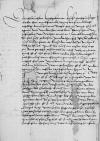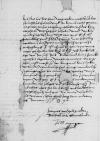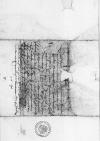Dem durc[hl]a[uchte]n, hochgebornen fursten unnd herren, hern ⌊Albrechten⌋, von Gots gnaden marggraff zu ⌊Brandenburg⌋, in ⌊Preussen⌋, zu ⌊Stetin⌋, ⌊Pomern⌋, der ⌊Cassuben⌋ unnd ⌊Wenden⌋ hertzog, burggraff zw ⌊Normberg⌋ und furst zu ⌊Rugen⌋, unserm hochgunstige[n], [lieb]en hern und freundt. /
Durchlauchter, hochgeborner furst, hochgunstiger, lieber herr unnd freundt. / Unnsere freundtliche, wÿllige dienst zuvoran. /
Negst hat an unns Ewer Furstliche Durchlaucht eÿnen irer unnderthan aus dem reinischenn ⌊⌋ / von wegen eines entfrembdten ochssen. / So hat sich gedochter unnderthan zw ⌊Ressel⌋ offentlich lossen heren, / er kente den wol, der in im deublich entfurt. / Unnd ist auch ein andre beÿsorge hir inne gewest, / dieweil er noch uberantwertung Ewer Furstliche Durchlaucht brieff / kein wider schreÿben begert, / sich heimlich vonn hÿnnen gemacht. Nichst wÿnnigers hab wir unnserm amptman uff Ressel lossenn befelenn, / wann gedochter Ewer Furstliche Durchlaucht underthann so[lc]hen ochssen wirt furdren, / das er in im ah... vorgeltung soll lossen folgen etc. Wir s...en Ewer Furstliche Durchlaucht dis mol zu schreÿben ver ursacht von wegenn unnsers besondren guttenn freundes, des hern woÿwoden zu Ploczke, / in der sachenn des erbteils, durch denn erbaren etwan ⌊Paul Samminski⌋ nochgelossen, / welchs von dem hohensteinschen landinge des hern woÿwoden verwantenn ist zugesprochen / unnd von dem spruche ahn Ewer Furstliche Durchlaucht vom wider[pa]rt geappelirt, / darzw dreÿ vierczehen tage angeseczt, / welche ( wie gezeugt wirt ) nicht sein gehaldenn, / domit die appellacion gefallenn. / Ist derwegen unser freundtlich, fleissig bitt, Ewer Furstliche Durchlaucht wolte dem landinge zum Hohenstein ( wie auch die billigheit furdert ) das teil des hern woÿwoden, / noch laut des spruchs, / zw halten / unnd in die mit recht gewonne gutter einzw weÿsenn / gebitten, / und das kein weÿterer verczog zw schaden unnd unkost wurde zwgelossenn, / das wir umb Ewer Furstliche Durchlaucht freundtlich unnd fleissig zuverdinen schuldig wollenn sein etc. Wir mugen auch uns nicht enthalden Ewer Furstlichen Durchlaucht ahnzuzeigen, / wie unns negst geschriben, das ⌊kayserliche mayestet⌋ uff das kunnfftige vor jor sich ins ⌊Niderland⌋ durch ⌊Franckereich⌋ zw begebenn / vorgenommenn, / das geschen nicht mocht, so der ⌊konig⌋ mit dem ⌊Turcken⌋ verbunden. / Wunderliche zeit bringt wunderliche zeÿtungen. / Got der alm[ec]htig verleÿ unns sein fried und genad h...den zw unsern tagenn / und gebe Ewer Furstliche [Durchlaucht] m ...il anndern noch komenden ein seliges und gluckreichs new jor / und alles, was hie dem leibe und der selenn ewiglich nutz und gut ist, amen. /
Datum aus unserm schlos ⌊Heÿlsperg⌋, denn andrenn tag Ianuarÿ M D XL.
⌊Joannes⌋, von Gots gnaden bischoff zw ⌊Ermelandt⌋ /
⌊Ioannes⌋ etc. manu propria subscripsit


